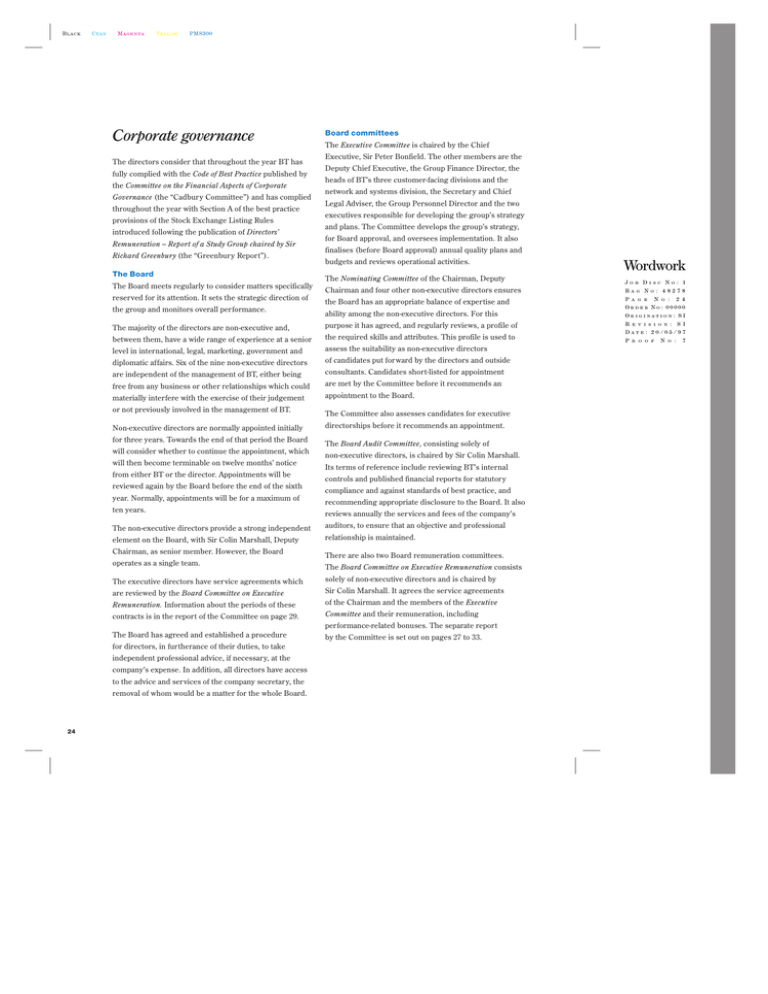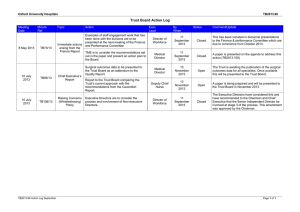Corporate governance
advertisement

Black Cyan Magenta Yellow PMS300 Corporate governance The directors consider that throughout the year BT has fully complied with the Code of Best Practice published by the Committee on the Financial Aspects of Corporate Governance (the “Cadbury Committee”) and has complied throughout the year with Section A of the best practice provisions of the Stock Exchange Listing Rules introduced following the publication of Directors’ Remuneration – Report of a Study Group chaired by Sir Richard Greenbury (the “Greenbury Report”). The Board The Board meets regularly to consider matters specifically reserved for its attention. It sets the strategic direction of the group and monitors overall performance. Board committees The Executive Committee is chaired by the Chief Executive, Sir Peter Bonfield. The other members are the Deputy Chief Executive, the Group Finance Director, the heads of BT’s three customer-facing divisions and the network and systems division, the Secretary and Chief Legal Adviser, the Group Personnel Director and the two executives responsible for developing the group’s strategy and plans. The Committee develops the group’s strategy, for Board approval, and oversees implementation. It also finalises (before Board approval) annual quality plans and budgets and reviews operational activities. The Nominating Committee of the Chairman, Deputy Job Disc No: 1 Chairman and four other non-executive directors ensures Bag No: 48278 the Board has an appropriate balance of expertise and P a g e N o : 2 4 Order No: 00000 ability among the non-executive directors. For this O r i g i nati o n: S I The majority of the directors are non-executive and, purpose it has agreed, and regularly reviews, a profile of R e v i s i o n : S I the required skills and attributes. This profile is used to Date: 20/05/97 between them, have a wide range of experience at a senior level in international, legal, marketing, government and assess the suitability as non-executive directors diplomatic affairs. Six of the nine non-executive directors of candidates put forward by the directors and outside are independent of the management of BT, either being consultants. Candidates short-listed for appointment free from any business or other relationships which could are met by the Committee before it recommends an materially interfere with the exercise of their judgement appointment to the Board. or not previously involved in the management of BT. Non-executive directors are normally appointed initially for three years. Towards the end of that period the Board will consider whether to continue the appointment, which will then become terminable on twelve months’ notice from either BT or the director. Appointments will be reviewed again by the Board before the end of the sixth year. Normally, appointments will be for a maximum of ten years. The Committee also assesses candidates for executive directorships before it recommends an appointment. The Board Audit Committee, consisting solely of non-executive directors, is chaired by Sir Colin Marshall. Its terms of reference include reviewing BT’s internal controls and published financial reports for statutory compliance and against standards of best practice, and recommending appropriate disclosure to the Board. It also reviews annually the services and fees of the company’s The non-executive directors provide a strong independent auditors, to ensure that an objective and professional element on the Board, with Sir Colin Marshall, Deputy relationship is maintained. Chairman, as senior member. However, the Board operates as a single team. There are also two Board remuneration committees. The Board Committee on Executive Remuneration consists The executive directors have service agreements which solely of non-executive directors and is chaired by are reviewed by the Board Committee on Executive Sir Colin Marshall. It agrees the service agreements Remuneration. Information about the periods of these of the Chairman and the members of the Executive contracts is in the report of the Committee on page 29. Committee and their remuneration, including performance-related bonuses. The separate report The Board has agreed and established a procedure for directors, in furtherance of their duties, to take independent professional advice, if necessary, at the company’s expense. In addition, all directors have access to the advice and services of the company secretary, the removal of whom would be a matter for the whole Board. 24 Wordwork by the Committee is set out on pages 27 to 33. P r o o f N o : 7 Black Cyan Magenta Yellow PMS300 C O R P O R AT E G O V E R N A N C E Non-executive directors’ remuneration Statement of BT Business Practice In line with the recommendations contained in the BT’s policy is to achieve best practice in our standards Greenbury Report, the remuneration of the non-executive of business integrity for all of our activities around the directors is set by the Board, on the recommendation world. To reinforce our determination to live up to these of the Board Committee on Non-Executive Remuneration. standards BT has adopted a Statement of Business Practice The non-executive directors’ remuneration is discussed which sets out the principles the group will observe. in the report of the Board Committee on Executive A copy has been sent to every employee. We also require Remuneration on page 29. our agents and contractors to apply these principles when representing BT. Internal financial control The directors are responsible for the group’s systems of Pension fund internal financial control. Such systems can provide only BT’s main pension fund – the BT Pension Scheme – is reasonable and not absolute assurance against material not controlled by the Board, but by trustees, who are Wordwork financial misstatement or loss. Key elements are: company and union nominees, with an independent Job Disc No: 1 chairman. The trustees look after the assets of the Bag No: 48278 pension fund, which are held separately from those of the Order No: 00000 company. The pension scheme funds can only be used in O r i g i nati o n: S I accordance with its rules and for no other purpose. R e v i s i o n : S I 3 Formal policies and procedures are in place, including the documentation of key systems and rules relating to the delegation of authorities, which allow the P a g e monitoring of controls and restrict the unauthorised 3 Reporting Experienced and suitably qualified staff take A statement by the directors of their responsibilities for responsibility for important business functions. preparing the financial statements is included on page 34. maintain standards of performance. 3 Forecasts and budgets are prepared which allow management to monitor the key business and financial P r o o f A report to the company by the auditors, Coopers & Lybrand, on corporate governance matters is set out on page 26. activities and risks and the progress towards financial objectives set for the year and the medium term; monthly management accounts are prepared promptly providing relevant, reliable and up-to-date financial and other information; significant variances from budget are investigated as appropriate. 3 All investment projects are subject to formal authorisation procedures, with an investment committee, comprising members of the Board, considering major investment projects. 3 The Board Audit Committee reviews reports from management, from the internal auditors and from the external auditors, to provide reasonable assurance that control procedures are in place and are being followed. 3 2 5 Date: 16/05/97 use of the group’s assets. Annual appraisal procedures have been established to N o : Formal procedures have been established for instituting appropriate action to correct weaknesses identified from the above reports. The Board Audit Committee has reviewed the effectiveness of the systems of internal financial control in existence in the group for the year ended 31 March 1997 and for the period up to the date of approval of the financial statements. 25 N o : 7



